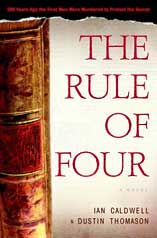« Fast Food Nation - Eric Schlosser | Home | The Hitchhiker's Guide to the Galaxy - Douglas Adams »
July 27, 2004
The Rule of Four - Caldwell and Thomason
I was inspired to read The Rule of Four, the first novel of two recent college grads Ian Caldwell and Dustin Thomason, by a review from a bookseller's website As Yet Unpublished. The Rule of Four is a fast-paced mystery that takes place on the campus of Princeton University. It revolves around an effort to decode a literary work from the Renaissance, the Hypnerotomachia, a real book around which there has been a lot of actual scholarly research. (See Introduction to Hypnerotomachia by MIT press.)
Like the other Renaissance code-breaking murder mystery, The DaVinci Code, to which it is often compared, The Rule of Four includes a couple of murders, a loyal team of sleuths, and plenty of historical references. The main differences are that The Rule of Four is actually much better written than The DaVinci Code, it is much more intellectually stimulating, and it doesn't try to rewrite the history of the Catholic Church.
The Rule of Four is a good read, and in some passages delightfully insightful.
I'd begun to realize that there was an unspoken prejudice among book-learned people, a secret conviction they all seemed to share, that life as we know it is an imperfect vision of reality, and that only art, like a pair of reading glasses, can correct it. The scholars and intellectuals I met at our dinner table always seemed to hold a grudge against the world. They could never quite reconcile themselves to the idea that our lives don't follow the dramatic arc that a good author gives to a great literary character. Only in accidents of pure perfection does the world actually become a stage. And that, they seemed to think, was a shame.
Having visited friends at Princeton while a college student and having actually eaten dinner at the famed Ivy eating club, I could laugh and relate to the descriptions of that place and the atmosphere on the campus. Of course I was there over 20 years ago and I think the Ivy was still an all male club. When I entered the dining hall all of the men stood up from the table until I was seated, as they did when any woman entered the room. This was the early 80s. I wonder how much longer that lasted? But I digress. As much as the book was cleverly written, and a good story, it is clear from the reading that the authors are young. They write as if they have figured life out pretty well, like so many of us thought when we were in our twenties. This can be a little tiring at times - enough to keep my dad from finishing the book, but not me. Like The DaVinci Code, it is a good read, although not a great work of fiction.
Links:
Introduction to Hypnerotomachia - by MIT press
Facimile of the orginal Hypnerotomachia
Posted by elise at 12:39 AM
to Fiction
5 Comments
Hi everyone,
I have a question about the ending of the book. So, they didn't explain it in detail, or i just missed it, so Paul wasn't dead?? He was in Italy and he found the ancient arts?? I hope I am right. This has been bothering me since i finished reading it, I hope to read the answer from you soon.
Thank you...
Neisargi...
Posted by: Neisargi on December 22, 2004 11:53 AM
well the ending is supposed to be up to your imagination
Posted by: Bob Dole on October 2, 2005 12:43 PM
I think, Paul is definitely alive & well. Who else could've sent the oil painting to Tom anyway? I thought maybe its Gil - but he isn't as smart/cryptic as Paul was.
Posted by: Romy on January 10, 2006 3:12 AM
This book is terrible. It is unoriginal and the writing is poor. Completely disagree with you Elise.
Posted by: Neena on July 1, 2006 9:56 PM
What tosh. These authors obviously think they're clever and want us to know it. I felt I was reading a students A-level course work.
Take the following taken at random from the book:
"You find a message in Latin. The only problem is, if you make just one mistake converting the Greek to Latin, the whole message breaks down. Replace entasi with ventris diametrum instead of just venter, and the extra 'D' at the beginning of diametrum changes everything."
I rest my case.
Michael Taylor, Cardiff, UK.
Posted by: Taylor on April 24, 2008 6:26 AM

I apologize for the inconvenience, comments are closed. ~Elise